Probably every person has encountered this. Previously, doctors found only one way out - surgery. Modern medicine and traditional methods allow you to relieve pain and inflammation without surgery. To relieve the symptoms of the disease yourself, you need to know how to treat inflamed tonsils.
Inflammation of the tonsils can be caused by a number of reasons. But they are all associated with infectious microorganisms that affect the mucous membrane. The most common cause is bacterial tonsillitis. To confirm the diagnosis, it is important to contact medical institution, since a sore throat can only be accurately determined by a blood test.
In children, so-called herpetic sore throat most often occurs. This is an infectious disease that is transmitted by airborne droplets. becomes the cause of an inflammatory process in soft tissues. In this case, a white or beige-yellow coating forms on the surface of the tonsils.
When purulent sore throat, pus appears on the tonsils, which provokes inflammation.
As a rule, all people develop immunity to bacteria and microbes from childhood. But if a large number of microorganisms (or) enter the body at the same time, and the person’s immunity is weakened at this time, then they settle on the mucous membranes respiratory system and begin to multiply intensively, causing inflammation, painful sensations and the development of various diseases.
The next reason for inflammation of the tonsils may be. This is a disease caused by the formation malignant tumor. It is represented by four stages. In the first and second stages there are practically no symptoms, but during development the voice begins to shrink, the tonsils begin to ache and become inflamed. In this case it is necessary health care, since in case of cancer it is almost impossible to cure inflamed tonsils at home.
Medical treatment and antibiotics

Since inflammation of the glands is caused mainly infectious diseases, then the treatment method must be selected accordingly.
Most often these are antibacterial drugs that in a matter of days will destroy the cause of inflammation - streptococci or staphylococci. Although antibiotics have a number of side effects, but only they will completely destroy viruses.Antibiotics should be taken strictly as prescribed by the doctor. If you have a sore throat, you need to take an antibiotic for at least five days.
The most common antibacterial agents:
- , which contains active ingredient– amoxicillin. This is a drug wide range actions aimed at destroying foci of infectious bacteria. The course of treatment is 7-10 days.
- , – broad-spectrum bactericidal tablets. The course of treatment is up to 12 days, under the supervision of a specialist, since this drug has many side effects.
- Vilpfaren is available in tablet form. The main component is josamycin, which kills bacteria.
In addition to tablets, you can use sprays that are designed specifically for sore throat. These are antibiotics for topical use:
- Hexasprey
There are also many drugs without antibiotic action. They are aimed at relieving the inflammatory process, facilitating breathing and swallowing:
- Kamiton
- AntiAngin
- Inhalipt
Whether it is necessary to use antibiotics for an inflammatory process in the tonsil area or whether simple antiseptic drugs can be used can only be determined by a specialist, depending on the condition of the throat and test results.
Gargling
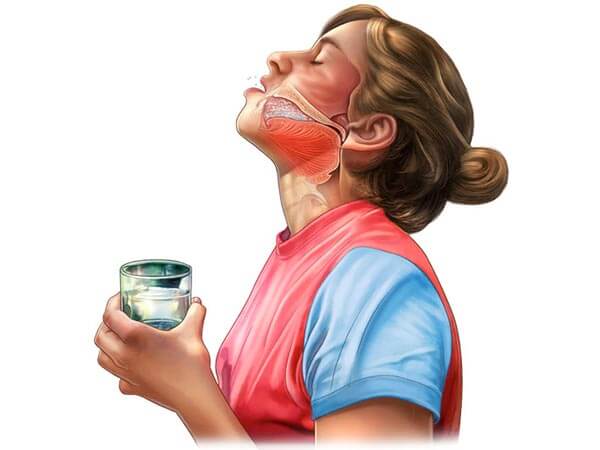
An excellent addition to the use of tablets would be gargling. This procedure helps soothe irritated tonsils, relieve inflammation, swelling and pain.
For rinsing, you can use formulations purchased at the pharmacy or prepared yourself. The best thing to remember is that you cannot use a solution that is too hot, so as not to damage your already irritated throat.
The most effective “talkers” for rinsing tonsils:
- For 250 ml. water you need to take salt and soda 5 grams (1 tsp) and three drops of iodine. Mix everything thoroughly and gargle up to 8 times a day. This method has no contraindications. It can be used by children, adults and pregnant women.
- . You need to dilute a spoonful of peroxide in a glass of warm water and gargle with the resulting mixture. It has a disinfecting and healing effect.
- , purchased at a pharmacy, is an excellent remedy for inflammation of the tonsils, regardless of the cause of the disease. They do not gargle, but “wipe” them. You need to wrap gauze or a piece of clean cotton cloth around a stick (pencil) and wipe the inflamed tonsils. The oil base of the drug makes it possible to penetrate deep into the source of inflammation and act directly there.
- Herbal decoctions. Medicinal plants Great for gargling. Chamomile, chamomile, are those remedies that have calming, antiseptic, anti-inflammatory, analgesic and regenerating properties.
It is necessary to alternate gargles throughout the day. Thus, pain syndrome subsides within 2-3 days. It is important to remember that this is the case complex treatment, and in addition to rinsing, it is important to kill the germs that caused the disease.
Inhalations
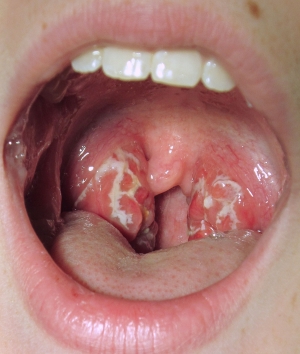
- significantly shortens the duration of the disease
- reduces the risk of complications by 80%
- relieves symptoms of the disease - inflammation, sore throat, makes breathing easier
- thins mucus in the bronchi and speeds up the healing process
When, vapors with beneficial substances penetrate directly into the source of inflammation, due to which they have an antibacterial effect: they destroy pathogenic microorganisms, preventing them from multiplying.
Inhalation has a number of contraindications and precautions that are important to follow in order not to cause harm:
- at elevated temperature body it is strictly forbidden to use the inhaler
- at acute form tonsillitis
- you need to be extremely careful when using the inhaler
- Thermal procedures are prohibited during pregnancy
In addition, it is important to make sure that there is no allergic reaction on the components that will be poured into the inhaler.
More information on how to treat a sore throat at home can be found in the video:
For the procedure, you can use a special device - or an inhaler. If this is not the case, you can use a regular pan, over the steam of which you need to breathe hot air.
When using a nebulizer, you can use medications:
- mineral water"Essentuki" or. Their vapors relieve swelling and fill soft tissues with vitamins and minerals, which restore intracellular processes and short term eliminate pain
- alcohol tincture of calendula, sophora or eucalyptus - have antiseptic and anti-inflammatory effects
- is a strong antiseptic drug. It can be used in pure form for adults or dilute 1/1 with saline for children under 12 years old
- – has a disinfecting effect, eliminates pockets of microbes, and eliminates swelling
Inflammation of the tonsils is called tonsillitis. For many years, Soviet doctors treated this disease surgically. To date, scientists have proven that by removing tonsils, we destroy a kind of barrier. After all, its function is to protect the body from even more complex bacteria, infections and all kinds of microorganisms. In any case, the attending physician decides how to treat the disease, based on the complexity of the disease and test results.
Symptoms of diseases characterized by inflammation of the tonsils
Tonsillitis or inflammation of the tonsils can occur in acute or chronic forms. Viruses, as a rule, lead to the appearance of acute tonsillitis, which often does not require special treatment. The main symptom is pain during swallowing, as well as a sore throat when swallowing. The tonsils themselves may be enlarged and develop a white film that can be removed without bleeding.
If you are worried about a sore throat during swallowing, weakness, or high fever, first of all, you need to suspect purulent inflammation of the tonsils. If you observe it regularly, this indicates that the disease has become chronic. In such a situation, there is a disruption in the functioning of the immune system, which can cause disturbances in the functioning of other vital organs.
In addition, symptoms may include temporary loss of voice. In the case of acute inflammation, the manifestations of the disease consist primarily of pain in the throat, as well as during palpation of the lymph nodes.
Symptoms of inflamed tonsils in chronic tonsillitis:
pain when swallowing;
sometimes dizziness;
enlarged lymph nodes (submandibular);
heat.
Signs of inflammation of the tonsils in acute tonsillitis or sore throat
To manifestations of acute inflammation
Fatigue, headaches, Bad mood, pain in the kidneys, heart, joints and muscles, and even, in some cases, a prolonged increase in body temperature. This happens because microbial waste products enter the blood and any other liquid medium of the body from the tonsils, poisoning the organs (tonsillogenic intoxication).
Tonsils turn into a reservoir for infections (streptococcus, staphylococcus and other microbes), from where they can spread widely throughout the body and become causes of inflammatory processes. First of all inflammatory processes arise in organs that are, so to speak, targets for diseases. When the tonsils become inflamed, the first to suffer are the heart, kidneys, and the skin on which acne, adnexitis, prostatitis, dysbacteriosis may appear, the paranasal sinuses may become inflamed, and joints may ache.
Due to decaying in the lacunae organic matter a strong and bad smell.
The tonsils cease to function as an immune apparatus; in addition, they themselves transform into a source of infection and begin to spread microbes throughout the body, which invariably leads to frequent and chronic diseases.
Frequent illnesses which are caused by inflammation of the tonsils, further deplete the body and lead to weakened immunity, which in turn leads to further development tonsillitis.
The most obvious symptoms of inflamed tonsils are severe pain in the temples, weakness and lethargy, decreased ability to work, and a constant and enduring feeling, day or night, that there is a foreign object in the throat that prevents swallowing. The throat feels sore, the body temperature is high, and the throat mucosa swells. In some isolated cases, aching pain appears, which can radiate to the ear or jaw.
The mechanism of development of acute inflammation of the tonsils
Acute tonsillitis (tonsillitis) is a common acute infectious disease that has local manifestations, for example, inflammation of the tonsils. This disease has been known for a very long time and its name, derived from the Latin word “ango”, means “to choke”. This name is not accurate, since sore throat is very rarely accompanied by suffocation, but it is widespread among medical workers and population, and is used on equal terms with the most appropriate term - acute tonsillitis.
When general immunity is reduced or the body is faced with a strong infectious disease(sore throat), in the lacunae of the palatine tonsils a real battle begins between microbes and immune system.
Thus, a large amount of pus begins to accumulate in the gaps, which consists of white blood cells, dead microbes, and cells. Palatine tonsils, clogged with pus, cease to function as an immune organ, and pathogenic microorganisms begin to multiply in the pus.
For what signs of inflammation should you call a doctor?
Tonsillitis is more common childhood disease. Therefore, it is necessary to understand that there are places at risk – schools and kindergartens. There are also a number of situations in which it is necessary to urgently consult a therapist. Although the inflammation is not very serious illness, but it carries a number unpleasant complications, so it is necessary to urgently treat the child’s illness. Signs that require calling a doctor to your child include:
Acute sore throat lasts more than 2 days;
Sore throat is accompanied by other symptoms and signs;
The general somatic condition of the body is constantly deteriorating;
There are breathing problems;
Lack of control over the flow of saliva (in children);
Strong pain makes it difficult to eat and drink.
Complications of the inflammatory process of the tonsils
It is very dangerous when complications begin with inflammation of the tonsils, which are associated with the spread of infections throughout the body, which can lead to:
Rheumatism of the heart and joints.
Glomerulonephritis.
Formation of heart valve prolapse.
Purulent inflammation of the tissues of the oropharynx (peritonsillar abscess).
Pneumonia.
Inflammation of the middle ear, and this may cause hearing loss.
Exacerbation of allergic diseases.
How to treat inflamed tonsils?
The inflammatory process of the tonsils itself is called tonsillitis. To find out exactly what the patient is suffering from of this disease, you should seek help from specialists who will make an accurate diagnosis by conducting an examination and performing tests. And only after this the treatment tactics are determined.
Therapy is prescribed based on the form of its course. For example, antibacterial drugs are prescribed only in the presence of purulent tonsillitis. Surgery indicated if chronic inflammation of the tonsils is not treated by other methods and leads to complications - in such a situation, the tonsils are removed.
Conservative treatment of inflammation of the tonsils
If you are experiencing inflammation of your tonsils, there are several issues you need to address. First you need to hand over everything necessary tests to be able to make an accurate diagnosis.
If tonsillitis is viral in nature, then it begins to be treated by destroying the virus. If installed bacterial origin antibiotics are prescribed for the inflammatory process. In this case, you need to know that you need to take the full course antibacterial drugs so that there is no relapse of the disease.
When a patient has such a problem, the course of treatment for inflammation should include the implementation of several tasks at once:
Restoring the functioning of the tonsils as immune organ. To do this, you need to wash the purulent mass from the lacunae. After this course of treatment, the ability of the lacunae to self-cleanse is restored, and intoxication goes away.
Identification of the suffering part of the immune system and bringing it to an appropriate state. To do this, you need to perform immunological blood tests and treat with immunocorrectors; if the need arises, an immunologist is involved in treatment. This makes it possible to achieve strong treatment results.
Avoiding exacerbations. For this purpose, preventive measures are recommended. Among which, washing lacunae twice a year has worked well, which reduces the likelihood of getting sick during the cold season, stops allergic exacerbations and bronchial asthma.
Conservative treatment inflamed tonsils involves regular sanitation of lacunae with removal of purulent plugs. It is recommended to carry out inhalation, gargling, and irrigation of the mucous membrane with a variety of disinfecting liquids. Conservative treatment of inflammation of the tonsils is recommended for chronic tonsillitis without complications in cases where surgery is delayed and the patient is mainly concerned about local manifestations of the disease.
Surgical removal of inflamed tonsils
As long as the palatine tonsils do their job, preventing the occurrence of infection, chronic tonsillitis is compensated, which means that inflammation of the tonsils can be treated using various conservative methods(lubrication, rinsing, physiotherapeutic procedures, etc.).
However, when the inflammatory process goes far and the palatine tonsils are deprived of healthy lymphoid tissues that fight infection, and they themselves turn into a focus of constant infections in the body, then this type of chronic tonsillitis is called decompensated and requires surgical treatment.
Frequent tonsillitis (2-4 times a year), accompanied by an inflammatory process, high body temperature, pathological purulent detritus in the gaps, the presence of certain complications associated with exacerbation of the process (glomeruonephritis, polyarthritis, etc.).
Frequent sore throats (2-4 times a year), accompanied by inflamed tonsils, high body temperature, observation of local signs chronic tonsillitis, without obvious complications, weakened immunity.
When, as a result of a single rare case of tonsillitis (every 5-7 years), complications arose in the joints, heart, etc., local symptoms lymphadenitis, chronic tonsillitis.
Detection of local signs of chronic tonsillitis against the background of heart disease, joints, etc. (mainly accumulation of purulent contents in the lacunae of the tonsils), which is difficult to treat conservatively.
Causes and prevention of inflammation of the tonsils
The causes of inflammation include:
infection in the tonsils (as a result of entry into the body through the mouth or nose);
weakened immune system;
Epstein virus;
Bara virus;
bacteria.
Preventive measures for inflammation of the tonsils
To prevent the disease you need:
Stop smoking, as nicotine impairs blood supply to the mucous membrane of the throat and destroys natural defense mechanisms respiratory tract.
Try to breathe through your nose, since the nasal mucosa plays the role of a protective filter that absorbs all small particles, including microbes.
Completely cure all diseases and strengthen the immune system, which is one of the main preventive measures with inflammation of the tonsils.
The causes of the disease are hidden in decreased immunity. The tonsils act as a kind of barrier that protects the body from the penetration of viruses and bacteria. If the body is faced with stress, vitamin deficiency, negative influence environment, inflammation occurs.
Inflammation of the tonsils is a collective term used to define a whole group of diseases of the throat and larynx.
In adults, inflammation of the tonsils can be acute or chronic. Chronic pathologies observed in 15% of the world's population.
In the human throat there is a so-called pharyngeal ring. The pharynx connects the larynx, oral and nasal cavities, nasal passages and esophagus.
There are six tonsils in the pharynx. The first pair are the palatine tonsils or tonsils, located symmetrically on one and the other side of the pharynx. If microbes enter the oral cavity, they are the first to be affected and take the blow.
Behind them are the tubal tonsils, they protect the passage into the pharynx from infection and are located next to the Eustachian tubes, which is why they got their name.
Above the pharynx, where the pharynx goes into nasal cavity, the pharyngeal tonsil is localized. And the last tonsil is called the lingual tonsil, it is located under the root of the tongue. Together, the six tonsils form the pharyngeal lymphatic ring.
All tonsils are dense lymphatic tissue that produces lymphocytes and antibodies. If an infection gets into the throat, the lymphatic pharyngeal ring begins to actively function, producing these substances to neutralize microorganisms.
If a person’s immunity is strong, the infection will be suppressed and he will not get sick. If the immune system is weakened, inflammation of the tonsils often develops.
In this case, any of the six can become inflamed, only on one side or on both. During a “massive” attack of viruses or bacteria, the entire pharyngeal ring becomes inflamed.
A sore throat is always caused by an infection. When viruses or bacteria enter the human oral cavity, they settle on the tonsils; if they manage to penetrate the lymphatic tissue, the inflammatory process begins.
The causative agents are most often pathogenic cocci - streptococci, staphylococci, pneumococci, which penetrate the larynx along with air.
The routes of infection can be the following:
- Contact with an infected patient. All bacteria and viruses are primarily transmitted by airborne droplets. Healthy man can become infected through kissing, sneezing, coughing, or simply talking to a sick person;
- Chronic infections of other organs oral cavity and nasopharynx - untreated caries, gingivitis, stomatitis, rhinitis provokes an inflammatory process in the tonsils;
- Through household and hygiene items. If a person uses other people's dishes, clothes, toothbrushes or towels, he can also get an infection;
- Tonsillitis chronic form. With this disease, pathogenic microorganisms are constantly present and multiplying in the tonsils; if a person’s immunity weakens due to hypothermia or another provoking factor, they will immediately become activated and begin to multiply even more intensely, causing acute inflammation.
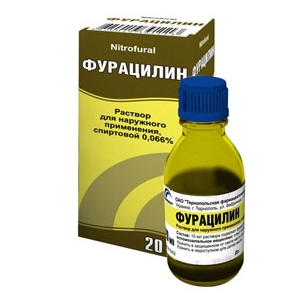 If you spend a long time outside in cold weather, breathing through your mouth, and constantly consuming cold foods and drinks, the risk of getting inflamed tonsils increases significantly.
If you spend a long time outside in cold weather, breathing through your mouth, and constantly consuming cold foods and drinks, the risk of getting inflamed tonsils increases significantly.
At low temperatures, mucous and lymphatic tissue are less resistant to infection, while their warm and moist surface provides an excellent place for bacteria and viruses to invade and multiply.
Depending on the type of pathogen, the following types of inflammation of the tonsils are distinguished:
- Bacteriological – caused by various cocci.
- Herpetic - provoked by the herpes virus.
- Fungal – develops with decreased immunity or oral candidiasis.
- Viral - the causative agent is monocytic tonsillitis.
The doctor evaluates the symptoms, determines the causative agent of the pathology, and then determines what to do next and what means to treat the sore throat.
Symptoms will depend on which tonsils are affected, what type of pathogen causes the inflammation, and how strong the patient’s immunity is. Most characteristic symptoms inflammation of the glands is as follows:
- Swelling and hyperemia of the mucous membrane;
- A sore throat;
- Enlarged lymph nodes located under the jaw in the neck;
- Increased body temperature;
- Headache and muscle pain.
The palatine tonsils are most often affected, since they are located “at the entrance” to the larynx and are the first to take on the attack of microorganisms. If they become inflamed, acute tonsillitis develops.
Symptoms in this case appear very clearly within a few hours after infection. There is severe swelling of the larynx, sore throat, cough, and painful swallowing.
Usually both tonsils become inflamed; less often, swelling of the tonsil on one side is observed. The throat becomes red and sore.
The symptoms of catarrhal sore throat are the same, but they are not so pronounced - moderate redness and swelling, sore throat, temperature up to 38 degrees. The patient feels well, this form can be successfully treated at home folk remedies.
Follicular tonsillitis manifests itself more clearly; inflamed tonsils in this form are covered with small round pustules of white or yellowish color. Lacunar tonsillitis develops rapidly and is difficult. The temperature can rise to 40 degrees, the swelling and pain in the throat are very strong, and pus accumulates in the lacunae - grooves on the tonsils. Symptoms of body intoxication are observed.
If phlegmonous tonsillitis develops, the tonsil is usually enlarged on only one side, and an abscess develops on it. Treatment of this form of sore throat is long and complex; this type is considered one of the most severe. Folk remedies will not help in this case.
If the pharyngeal tonsil becomes inflamed, then they talk about the proliferation of adenoids. This pathology can be caused by chronic sinusitis or tonsillitis. Swelling of the tonsil makes nasal breathing difficult - the patient constantly breathes through the mouth. flows down the back wall of the larynx and irritates the mucous membrane, which provokes a cough that gets worse at night. Nocturnal snoring is also noted.
If the infection spreads deeper, the Eustachian tubes may be affected on one or both sides, the patient complains that his ears are blocked and hurt, and his hearing is reduced. With chronic adenoiditis, the temperature rarely rises, the enlargement and swelling of the lymph nodes is insignificant. Headaches occur frequently general state the patient is weakened.
Very rarely the lingual tonsil becomes inflamed. This type of pathology manifests itself specifically:
- Swelling of the tongue, impaired mobility;
- Difficulty chewing food and swallowing;
- Diction problems.
Inflammation of the tubal tonsils is often confused with otitis media, since with this form of pathology the patient’s ears also hurt and hearing is impaired. The disease can be distinguished from inflammation of the middle ear by the following symptoms:
- Parotid The lymph nodes not increased, or increased slightly.
- First, the throat begins to hurt, and then the pain spreads to the ear canals.
- By back wall purulent mucus drains from the larynx.
- Severe intoxication – fever, chills, headache, weakness, aching joints.
In acute, severe cases of the disease and severe intoxication, high fever and cough can provoke vomiting, and convulsions often occur.
Treatment of tonsils at home
Before treating infected tonsils at home, it is necessary to create appropriate conditions for this. To do this you need:
- Isolate the patient. If it is not possible to allocate him a separate room, then you need to at least allocate a small space for him away from other households, as well as individual linen, a towel, and dishes;
- Stick to bed rest - physical activity will provoke the spread of infection and prolong the treatment process;
- Maintaining a drinking regime; drinking plenty of water will help quickly remove microbes from the body and avoid dehydration at a temperature - tea with lemon, rosehip infusion or medicinal herbs.
At home, they help very well with sore throats as one of the rinsing methods of treatment. You need to do the procedure every half hour or hour in the first days. Solutions of Furacillin, Lugol, Iodinol, Rivanol are used for rinsing. If you treat a sore throat with folk remedies, then soda and saline solutions, decoctions of chamomile, calendula, sage. Can be used
Is it possible to treat inflammation of the tonsils at home? Every person faced with a problem thinks about this question.
In fact, it is possible, but with minor degrees of severity. Medicine recommends that you always contact a clinic to establish an accurate diagnosis, since some symptoms of inflammation of the tonsils may be signs of a completely different disease.
And after that, you can safely use products that effectively fight viruses.
Characteristics of inflammation of the tonsils
The tonsils, also known as tonsils, consist of lymphoid tissues. Their location is the oral cavity in the area of the soft palate and the root zone of the tongue.
Their task is protective function . This is a kind of barrier due to which pathogenic microorganisms do not penetrate inside the body.
Inflammation occurs when too many of these viruses accumulate in the tonsils or when the immune system is weakened.
In the second case, a small amount of bacteria is enough for inflammation. Disease of the tonsils is an infectious. Moreover, among pathogenic microorganisms one can distinguish not only viruses and bacteria, but also fungi.
Peculiarities
Most often, inflammation of the tonsils is observed in children, but it also occurs in adults. Pathology has three main forms, each with its own severity and duration:

Causes
The tonsils can become inflamed due to the development of certain diseases when affected by the following pathogenic microorganisms:
- staphylococcus;
- streptococcus;
- Pneumococcus;
- herpes virus;
- yeast fungi.
The inflammatory process is provoked by the following factors:
- hypothermia and colds;
- infection from a sick person;
- decreased immunity;
- tonsillitis, scarlet fever and other pathologies of the respiratory system;
- genetic predisposition;
- infection due to non-compliance with personal hygiene rules;
- diseases of the oral cavity and nose (sinusitis, caries, periodontal disease, etc.);
- avitaminosis.
Sore throat - inflammation of the tonsils
Symptoms
- swollen lymph nodes;
- increased body temperature;
- pain when swallowing and palpation of lymph nodes;
- redness of the tonsils;
- presence of plaque;
- the voice becomes hoarse, and in rare cases disappears altogether.
Treatment methods
Before treating inflammation of the tonsils, it is necessary to establish the cause of the disease and identify the causative agent. Only a doctor can do this.
After all, for each microorganism there are certain medications. Therefore, contact the clinic immediately!
What to do in case of inflammation of the tonsils is mandatory:

 Modern medicine knows exactly what to gargle with when the tonsils are inflamed. These are pharmaceutical solutions:
Modern medicine knows exactly what to gargle with when the tonsils are inflamed. These are pharmaceutical solutions:
- "Furacilin" can be purchased in tablets or ready-made solution. If you have tablets, then dilute 1 unit in 0.5 glasses of water.
- "Lugol" counts strong antiseptic, but dilates blood vessels.
- "Miramistin" used for almost all types of pathogenic microorganisms.
- "Iodinol" contains the main active ingredient – iodine.
- "Chlorhexidine" created on the basis of chlorine.
- "Chlorophyllipt" prescribed for staphylococcal infections.
- "Hydrogen peroxide" used extremely rarely. Diluted with water in a ratio of 1:2.
- "Hexoral", "Rivanol" And so on.
How to relieve inflammation of the tonsils using drug therapy and is it necessary? Many people don’t want to take medications, but it is necessary. Because exactly drug therapy is the main one in the whole complex of treatment.
List of the most effective and popular drugs:
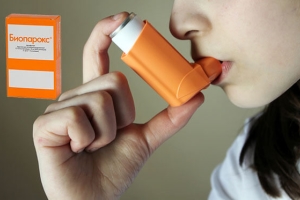
Antibiotic drugs are allowed to be used only as prescribed by a doctor!
Remember, every organism has individual characteristics, and inflammation of the tonsils is the course of the disease. What is suitable for one patient may be contraindicated for another.
Treatment with folk remedies
Treatment by means traditional medicine is always included in the therapy complex, because medicinal herbs and other components have many beneficial substances.
But remember, before treating inflammation of the tonsils with such means, be sure to consult your doctor!
Here are some recipes for the most effective solutions for gargling:
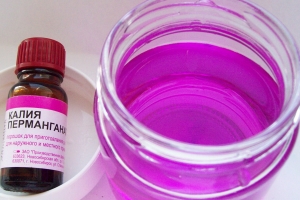
Decoctions and warmings
 During illness, you need to drink a lot of fluids, but you need to drink healthy drinks:
During illness, you need to drink a lot of fluids, but you need to drink healthy drinks:
- herbal decoctions;
- rosehip compote;
- tea with lemon and honey;
- warm water with lemon;
- warm fruit drinks and juices.
Warming the lymphatic tissue reduces swelling and relieves pain. To do this you can use the following:
- heat the kitchen (coarse) salt. Pour it into a fabric bag and apply it to the inflamed area. But keep in mind that the salt should not burn;
- Mustard plasters are also perfect;
- be sure to steam your feet in the solution sea salt or with dry mustard;
- Try to keep your feet warm and wrap a woolen scarf around your throat.
Other traditional medicine recipes
- Be sure to use honey. It can be eaten plain or added to tea, decoctions, or inhalations.
- Vodka compresses help a lot. If you have pure alcohol, then dilute it with water so that you get a maximum of 50 degrees. Moisten a piece soft fabric in vodka and apply to the fireplace. Please note that when hypersensitivity skin, the compress can be placed through polyethylene.
- This recipe is most recommended for children. younger age. Take some warm cottage cheese and mash it with boiled potatoes and wrap everything in gauze. Apply to your throat until it cools completely.
Inhalations
 Our great-grandmothers also used inhalations. Considering them an effective remedy in the fight against many diseases of the respiratory system.
Our great-grandmothers also used inhalations. Considering them an effective remedy in the fight against many diseases of the respiratory system.
But is it possible to warm the tonsils during inflammation? There is no definite answer, since only a doctor can authorize inhalation, based on indications.
In addition, you need to know that when high temperature steam procedures are contraindicated. Therefore, inhalation can be done only in the absence of heat in the body.
Peculiarities
Inhalations can be carried out in several ways:
- Using special devices - inhalers and nebulizers. The most modern device is a nebulizer.
- Steam can be inhaled directly above the container.
- You can use a teapot spout, a paper funnel, or a kitchen watering can.
Inhalations have many benefits. For example, if you use medicinal solution by inhaling in a warm form, the beneficial substances penetrate into the deeper lacunae of the tonsils, providing the maximum healing effect.
Also, during inhalation, medicinal substances are distributed more evenly, which leads to the fastest action facilities.
You need to know how to properly do inhalations for inflammation of the tonsils:

What to do with inhalations
Inhalations can be done using the following means:
- They pour into the inhaler medical solutions(they were mentioned above).
- Soda solution with iodine. Dissolve a couple of tablespoons of soda in 0.5 liters of water. Add some iodine.
- Alkaline mineral water effective for babies.
- Essential oils: juniper, pine, fir, eucalyptus, anise, fennel. Add a few drops of oil to boiling water. Can be added to soda solution.
- Decoctions of medicinal herbs. You can use herbs: chamomile, eucalyptus, fir, mint, thyme, oregano, etc.
- You can inhale the vapors of boiled potatoes. To enhance the effect, add a little iodine and soda.
- Helps well decoction of pine buds.
remember, that untimely application see a specialist or incorrect self-treatment leads to serious complications and unpleasant consequences.
One of these is surgical removal tonsils Many people encountered this procedure in Soviet times.
Today, surgery is carried out using innovative methods. But you should think a thousand times before lying on the operating table. After all, the tonsils act as a protective barrier!
Exacerbation chronic course tonsillitis is called tonsillitis. According to the localization of the process, it can be one-sided or two-sided. With a unilateral process, one tonsil becomes inflamed; with a bilateral process, both palatine tonsils are affected. Depending on the forms, course and pathogen, different therapy is prescribed. Therefore, it is very important to contact a specialist at the first manifestations of the disease, who will conduct a differential diagnosis and explain how and with what to treat inflamed tonsils.
Unfavorable factors contributing to the development of tonsillitis:
- hypothermia of the body;
- the tonsils can become inflamed from injuries and burns of the pharynx;
- infectious processes in ENT organs;
- chronic pathologies that reduce immunity;
- deficiency of vitamins and minerals;
- prolonged contact with allergens;
- diseases in which lymph flow in the body is disrupted;
- tonsils can become inflamed if you have bad habits: smoking, drinking alcohol.
The causative agent of tonsillitis is a wide range of microorganisms: bacteria, viruses, fungi, bacilli (diphtheria, intestinal, fusiform), spirochetes, helminths, mycoplasmas. Bacterial sore throat is most often caused by beta-hemolytic streptococcus. Bacterial etiology of the disease is much less common than viral etiology (up to 30% of children, up to 15% of adults).
Sore throat is extremely contagious. The patient is contagious from the beginning incubation period until it subsides severe symptoms
Diagnostics
A visual examination of the oropharyngeal cavity is very informative for angina. But in diagnosis, the main thing is to identify the causative agent of the disease, since treatment will depend on this. The type of pathogenic agent is determined by culture of a throat swab. The laboratory method takes 1-3 days, but in case of acute tonsillitis it is necessary to start treatment as early as possible. Currently, there are rapid tests with which the doctor identifies the type of microorganisms within 10 minutes right at the appointment. From additional examinations is taken general analysis urine and blood. For differential diagnosis Sputum analysis and magnetic resonance imaging may be needed.
Traditional Treatments
In addition to adequate therapy great value For favorable outcome has bed, drinking and dietary regimes. You should not endure a sore throat on your legs, as serious complications may develop. Bed rest must be observed from the onset of the disease until severe symptoms subside. For viral etiology, symptoms subside within 1-3 days, if prescribed correct treatment. For bacterial  pronounced etiology clinical picture can be observed for 5-14 days.
pronounced etiology clinical picture can be observed for 5-14 days.
Duration acute period depends on the state of immunity and the correctness of therapy.
During the period of illness, do not eat solid, hot, cold, or aggressive foods. Dishes must be freshly prepared and warm. There is no need to eat foods that are difficult to digest: meat, lard, sausages, fatty fish, cakes, sweets. The body spends a lot of energy on digesting such products, which is already lacking, especially in the acute phase. It is not recommended to drink freshly squeezed juices, especially citrus juices; they are aggressive to the pharyngeal mucosa. They can be diluted half and half with water. You need to drink warm tea with honey and lemon, weak broths, low-fat fermented milk and dairy products, non-acidic fruit drinks, jelly, liquid yoghurts.
If the tonsils are inflamed due to bacterial infection, then the basis of treatment is antibacterial therapy. Broad-spectrum drugs are prescribed, depending on the sensitivity of the patient’s body to a particular group of antibiotics.
At viral infection the use of antibiotics is inappropriate. Also, antibiotics cannot be used as prophylaxis.
Symptomatic therapy
To relieve symptoms, the following medications are prescribed:
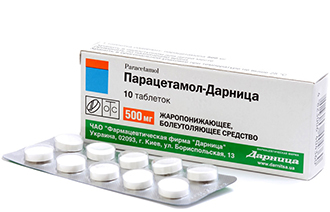
Long-term use acetylsalicylic acid may cause bleeding.
Nimesulide is an effective antipyretic and analgesic drug, but it should be taken with caution by people with diseases of the digestive tract.
Combined drugs analgin and ibuprofen practically do not cause side effects when used for a short time. The only thing is that analgin has a toxic-allergic effect and in very rare cases can cause anaphylactic shock. Analgin is also available in injection solutions, this is convenient if the patient is in serious condition and cannot take pills on his own;
Antipyretics should be taken only as a last resort during febrile fever, strictly observing the dosage
- antitussive drugs. There is a huge list of antitussives, all of them are divided into certain groups and are prescribed depending on the type of cough and the patient’s condition. Currently the preference is effective drugs without narcotic components: libexin, glaucine, tusuprex, paxeladine. These drugs are not prescribed to women during pregnancy and lactation, patients with respiratory failure, and children under 2 years of age;
- complexes of vitamins and microelements to strengthen the immune system. Combination drug The alphabet contains the most vitamins (13 out of 13 essential) and minerals (10 out of 20 essential). An effective complex for tonsillitis is the drug Gerimax (10 vitamins, 7 minerals).
Local therapy
None of them can do without local therapy. Antiseptics are prescribed in sprays for irrigating the throat. They disinfect, soften, anesthetize the mucous membrane, and facilitate swallowing and breathing. For bacterial tonsillitis, antibiotic sprays (Hexoral, Stopangin, Ingalipt, Bioparox) are used; for viral tonsillitis, anti-inflammatory agents are used. active substance(propasol, trantum verde). If the drug does not help after twice use, it should be replaced.
Frequent gargling is required. Using this procedure, plaque is washed off, germs are destroyed and evacuated, and purulent plugs, the mucous membrane of the oropharynx softens, inflammation, pain, hyperemia, swelling are reduced, and the healing process is accelerated.
The most common and effective remedy for this purpose - saline solution. You can buy it ready-made or prepare it at home: 200 ml of warm boiled water 2-3 grams of table salt. Can be added to the solution baking soda on the tip of a spoon and a couple of drops of iodine. You should not eat or drink liquids 20 minutes before the procedure and for 20 minutes after the procedure. Rinse for 7-10 days. In addition to saline solution, a solution of furatsilin, miramistin, chlophilipt (oil or alcohol solution) is used.
Inhalations are most conveniently carried out using a nebulizer. The following means are used for inhalation:
- Furacilin is a powerful antiseptic;
- Miramistin is a broad-spectrum antiseptic, a universal remedy used for all infections of the oropharynx;
- cromohexal - used for severe swelling throat and tendency to spasms;
- Tonsilgon N is a homeopathic remedy with natural plant components that have a resolving, antiseptic, anti-inflammatory effect;
- fluimucil antibiotic - used for initial stage purulent process in the tonsils, in many cases can replace the use of systemic antibiotics;
- chlorophyllipt is a bactericidal alcohol or oil solution that effectively eliminates pain, swelling of the tonsils and pharyngeal mucosa.
Mustard wraps and warm compresses on the throat give good healing effect. Water, alcohol, saline solution, and mustard plasters are used as a warming component. The main thing is not to overexpose the compress and not lead to a burn. 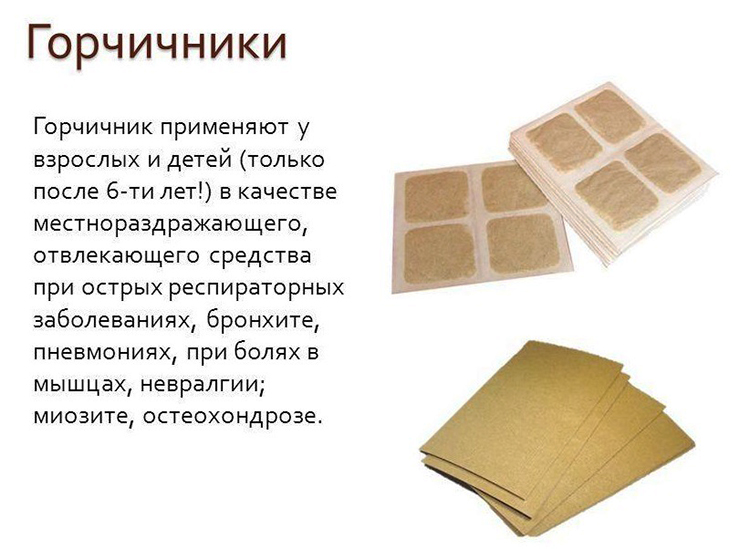
Warming procedures cannot be carried out at elevated body temperatures and in the purulent stage of the process
Traditional methods of treatment
- gargling with beetroot or lemon juice diluted with water 1:10;
- For rinsing, tinctures of propolis, Kalanchoe, aloe, and eucalyptus are used. Tinctures are not used in the acute phase, when there is intense pain in the tonsils and severe redness;
- throat compresses made from sage decoction with vinegar;
- mustard or ginger powder is poured into thin socks, woolen socks are put on top, the procedure is carried out overnight until recovery;
- for inhalation use essential oils eucalyptus, lemon oil, ginger, cinnamon;
- drink milk or tea with honey, cardamom or cloves, herbal decoctions with anti-inflammatory, diaphoretic effect. The main condition is that the drink should be warm and pleasant.
Other methods of treating inflamed tonsils include: homeopathic remedies, ultrasound therapy, magnetic therapy, laser therapy.
Sore throat is not as terrible as its consequences. Delayed or illiterate therapy leads to the development of serious complications: inflammatory processes in the heart and blood vessels, glomerulonephritis, rheumatism, laryngeal edema, peritonsillar abscess, meningitis, blood poisoning, brain abscess. Many of these diseases  may end fatal Without specialized assistance, and other conditions will require long-term treatment.
may end fatal Without specialized assistance, and other conditions will require long-term treatment.
Preventive measures will significantly reduce the risk of developing acute tonsillitis or allow it to be transferred to mild form. Specific prevention there is no sore throat, there are only general recommendations: strengthening the immune system, playing sports, refusing bad habits, good nutrition, consumption of vitamins.
Sore throat is transmitted by airborne droplets (through the air), by contact (through household items), and by nutritional means (through dirty hands, contaminated water). Therefore, you need to avoid contact with an infected person and crowded places during an epidemic of colds.








